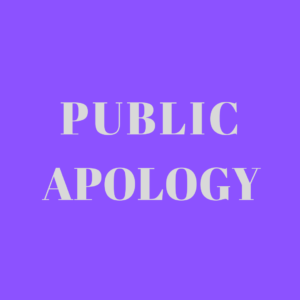On Sunday, June 2nd, 2019, as part of our 12th annual festival, we hosted an event called Gay Guerilla: Julius Eastman, featuring the work of the late artist Julius Eastman, a queer, black composer based primarily in downtown New York City until his passing in 1991. This event was lead by Mary Jane Leach, a composer, researcher and friend of Julius Eastman and was facilitated by Nivie from We Are Missing, a collaborative community project that aims to create QTBIPOC programming in K’jipuktuk.
This event caused direct harm to those involved, those in attendance and to the broader communities surrounding our organization, particularly QTBIPOC folks. We recognize and name this as an instance of anti-black racism. We accept full responsibility for this harm and intend to take measures of accountability and transparency moving forward, in hopes of honoring those who experienced violence as a result of our negligence. We sincerely apologize to all those who faced harm/violence as a result of OBEY’s choices in programming this event. We recognize that an apology without direct action and change is meaningless, and plan to move forward by naming the harm caused, working to offer support / healing and implementing structural changes to how we program in hopes of reducing further possibilities of harm.
Three sections follow: a summary of the event and harmful behavior as we currently understand it, statements around background and internal processes, admissions and failures, and finally our intentions / action plan moving forward.
SUMMARY
During Leach’s exposition of Eastman’s life and work, she repeatedly invoked a racial slur by referencing, verbatim, the titles of a series of self-portraits composed by Eastman in the late 1970s and early 80s. At the outset of her talk, Leach made a statement that it would contain explicit, complicated language and that, while she wrestled with whether or not to include said language throughout her engagements with Eastman’s work, she intended to do so on the day in question as a means of honoring what she understood as the intentions of the work and the artist. We recognize that this contextualization was not enough and does not excuse the way in which this program curated, implemented or performed.
It is our understanding that discomfort, unease and violence was felt by many, in the room as Leach invoked these titles. Following Leach’s presentation, Nivie began unpacking some of the complications inherent in Leach’s research and her position as a white person telling the story of a queer, black person’s life. Through pointed questions by the facilitator and feedback from several attendees, Leach’s use of language and handling of Eastman’s life and legacy were called into question and identified as problematic and an example of colonial oppression. Leach’s work and presentation thereof was, in tandem, lauded by a self-identified queer, black attendee, who described it as “brave and important”. The event ended without interference or acknowledgement on behalf of OBEY Convention of the harm perpetrated in the room, and of that we are regretful.
Following the event, a pair of Leach’s pieces were to be performed at a venue nearby. Before the concert began, a number of people approached OBEY Convention staff to express their feelings that the preceding event had been harmful, inappropriate, and careless. In light of this, OBEY was offered the question of whether or not to move forward with Leach’s performance. These concerns were heard and taken with the utmost seriousness. A closed-door discussion ensued including those who came forward with concerns, members of the OBEY Convention Board of Directors, a member of its Programming Committee, and its two core staff members.
To honour the voices that came forward, in trust and confidence, and shared their experience of harm, we decided to pull Leach’s performance from the evening’s program to avoid perpetuating further harm and our continuation of silence. This decision was made not as a punitive gesture towards Leach, but rather as one of care and harm-reduction towards the more vulnerable, racialized people harmed by our prior programming. After informing Leach (and the musician set to perform her music) of the decision, the following statement was drafted collectively and read by creative director Andrew Patterson, joined on stage by executive director Kat Shubaly, and board members Sara Russell and Ray Fernandes:
Earlier today we hosted a program including the third artist on tonight’s bill. We acknowledge that that program caused direct harm to community members in attendance. As creative director, I accept responsibility for allowing and perpetrating this harm, not only in a programming capacity but also as a person in attendance who remained silent. In light of this, we’ve decided to pull the final performance in hopes of preventing any further harm. This is the first step in a process of accountability. Thank you for listening, thank you for your support, and for the care you’ve shown this organization.
STATEMENTS
While OBEY Convention creative director Andrew Patterson was well aware of Eastman’s work, their titular language, and their complicated legacy, he failed to have a thorough-enough dialogue with Leach and We Are Missing in lead up to the event. This resulted in surprise, shock, violence, discomfort, harm and a number of associated experiences for the presenters and those in attendance. We sincerely regret the lack of forethought leading up to the event and the lack of immediate action during the event. We recognize that the violence imbued within this event caused specific harms to members of the QTBIPOC communities present. Our organization intends to centre the feelings and experiences of these people as we endeavour towards accountability.
This event was instigated and curated by Patterson in conversation with OBEY’s programming committee, a group of three volunteer community members whose responsibility was to review submissions and offer guidance to the Creative Director in developing the festival program. During this process, concerns and objections were raised by the committee around inviting Leach and her work to the festival, stemming from the following foundational problematic element: as her being a white person telling the story of a black person’s life. The committee asked Patterson to research a number of interrelated concerns to see if such a presentation could be ethical, given the complicated circumstances. After some research and discussion with Leach, Patterson informed the committee that he felt their questions had been satisfied and decided to move forward in naive optimism with the caveat that the conversation include facilitation by or dialogue with a queer, POC voice.
At this point, too late in the process, We Are Missing was approached by Patterson as a prospective facilitating body due to their collective work challenging institutions to create alternative QTBIPOC programming. After initial discussions and being sent links to both Eastman and Leach’s work, We Are Missing agreed to take part in a facilitation that unpacks privilege in the conversation around Eastman’s work and Mary Jane’s life in relation thereof. We wholly acknowledge that the way in which We Are Missing was engaged was tokenistic. In a careless attempt to include lived experience into the program after it had already been curated, we exploited said lived experience instead of honoring or platforming it. It was reckless and irresponsible to structure this program without allotting more time for dialogue and discussion, offering thorough warnings, contextualizing the work, and by excluding voices from people with lived experience. Regrettably, we set up the participants and the audience to face harm.
Our inaction during the event served to further the harm perpetrated and acted as condonement of the violence experienced by those in attendance. We recognize that many people in attendance were made vulnerable to and affected by the racist and colonial sentiments that were present both in the room and in OBEY’s curation of said event. The work presented, and the traditions from which Leach is working, need to be held up to the highest scrutiny. We failed to enact that scrutiny ourselves and worse, failed to facilitate a space in which such scrutiny could be truly heard or felt. We subjected all in the room to a responsibility that they should not have been made to hold. We are deeply sorry for this and intend to hold space for the feelings left unresolved.
For all of this and more, we are deeply sorry. We thank everyone who generously shared their concerns, feelings, and hurt with us. We hear you. We want to honor you. We are committed to doing better.
MOVING FORWARD
We are engaged in serious, active, internal discussions at present.
We are open to being in dialogue with any and all people who feel hurt as a result of this problematic programming. We are committed to listening to and believing survivors, and to (re)building trust with marginalized communities.
We intend to support the facilitation of a healing event wherein those who felt harmed by the talk in question can share their experience, have their voices heard, and move towards collective healing.
We have been in touch with Mary Jane Leach post-festival and intend to instigate conversations of and around accountability, provided she continues her willingness to stay in touch. Beyond the repeated invocation of the racial slur, it is our feeling that Leach did not receive the criticisms and questions posed to her with the honour and respect they deserved.
We intend to implement changes to our curatorial processes and seek consultation from, and compensate, community voices throughout this process.
We intend to reassess the structure of our programming committee and explore how we can better support / compensate / include / listen to said committee.
We offer anyone who paid to be present at the show wherein Leach’s compositions were pulled from the programme a full refund. Please contact regarding that.
We recognize that this is a big, long and complicated process and are committed to listening to and showing up for the individuals and communities harmed.
Sincerely,
Andrew Patterson
with support from the OBEY Convention Board, Programming Committee and Executive Director
Anyone seeking immediate dialogue can reach us at

